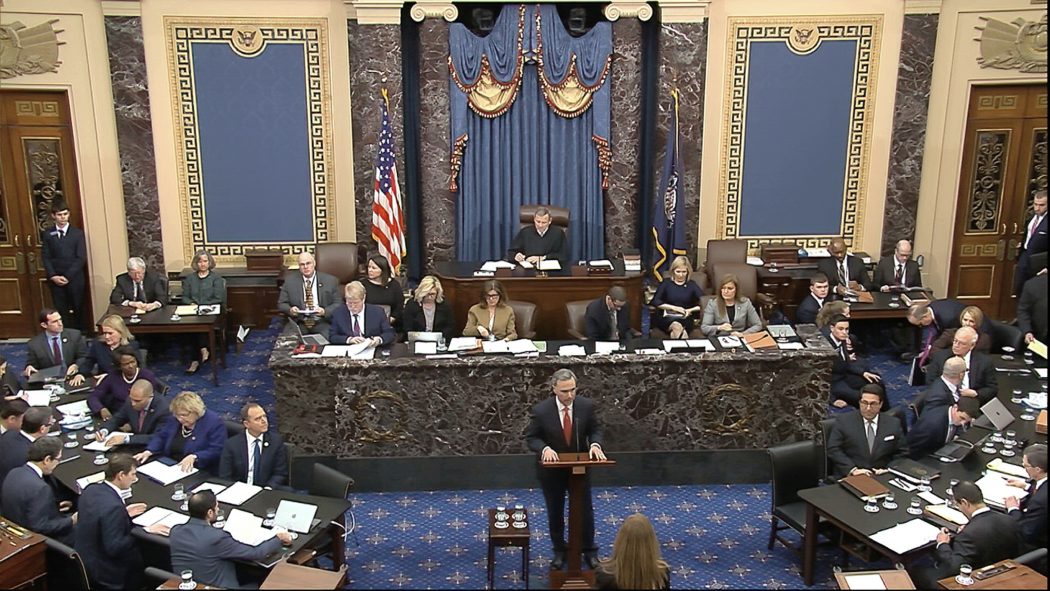Opinion: And Justice For Some: How the Senate dropped the ball on Trump’s impeachment
Over the past four months, the world of politics has produced a whirlwind of news that is dominating airwaves and newswires alike. President Donald Trump’s impeachment is capturing the awe, and ire, of much of the United States, as well as across the world. Unfortunately, all the attention and facts brought to the partisan process was still not enough to convince the Senate to do the right thing and give the case its due diligence.
For only the third time in America’s 243-year history, a sitting president was impeached by the House of Representatives and is all but guaranteed to be acquitted by the Senate.
This seemingly foregone conclusion was all but sealed on Jan. 31, when the Senate voted 51-49 to deny a motion which would allow witnesses to testify in the trial. A decision made mostly along party lines, this move reflected an overall division amongst members of Congress regarding any consideration of Trump’s guilt over the mishandling of military aid to Ukraine.
How can this happen, you may ask. How can a trial be conducted without either side presenting witness testimony? The answer to this is fuzzy and, unfortunately, easy to explain: it can happen because Mitch McConnell and the Republican-led Senate made the rules that way. That’s right, the trial of an impeachment is as regulated as gun laws in Texas.
The Constitution provides little guidance for the rules of impeachment, asserting that the House of Representatives “shall have the Sole Power of Impeachment” and the Senate “shall have the sole Power to try all Impeachments.” So it is up to the individual chambers to set their own procedural guidelines and hope they will provide for a fair and thorough process.
Only “fair and thorough” is in the eye of the beholder. For Republicans in Congress, the House’s impeachment inquiry was a speedy, unfair “sham” of an investigation which robbed Trump of his right to due process. Conversely, Democrats criticized the GOP for a “sham” trial by shooting down every motion to consider additional documents and allow witness testimony. I guess you could say one side was shammed if they do, shammed if they don’t.
The ambiguity of the constitutional language surrounding impeachment empowered both parties to push their respective narratives, while discrediting the other side’s interpretation along the way. Alexander Hamilton was spot on when he said impeachment would “seldom fail to agitate the passions of the whole community, and to divide it into parties more or less friendly or inimical to the accused.”
For example, House impeachment manager Adam Schiff and his team argued that the president’s freezing of aid to Ukraine amounted to an abuse of power, which they interpreted as an impeachable offense. As a rebuttal to this assertion, one of Trump’s defense attorneys, Alan Dershowitz, contended the president was within his rights as president because “[i]f a president does something which he believes will help him get elected, in the public interest, that cannot be the kind of quid pro quo that results in impeachment,” he said.
However, this still doesn’t answer the question as to why the Senate wouldn’t hold a trial that included witnesses, especially that of Trump’s ex-National Security Advisor John Bolton. If the president and his legal team were so convinced of his innocence, wouldn’t they want to have people testify to support that claim?
Apparently not, as one could argue their contempt for the House’s refusal of due process for the president and stymied attempts at gathering witnesses during the inquiry was reason enough to deny Schiff and company the chance to potentially prove Trump’s guilt. Whatever the reason behind their decision, Repbulican leaders and Trump’s defense further dusted key evidence under the rug, under false pretenses no less.
First, due process, as it is carried out in regular legal proceedings, doesn’t apply to impeachment inquiries. An impeachment inquiry serves as a sort of grand jury, in which House members use witnesses and other evidence to fact-find, which excludes cross-examination. It is in the Senate impeachment trial, where the president’s defense has the opportunity to cross-examine witnesses. Ironically enough, the exercise Trump’s defense accused the Democratic-led House of omitting has now been left out of the process where it actually belongs.
Semantics and legalese aside, this impeachment has exposed the legislative body for the divided branch that it is, with some putting party and political gain over the will of the people. According to multiple polls, 75% of Americans were in favor of hearing witness testimonies in the Senate trial. If that isn’t a slap in the face of the concept of a “government of the people, by the people [and] for the people,” I don’t know what is.
Finally, it is worth noting that in the history of impeachment, of presidents and other government officials, every trial held in the Senate included testimony from witnesses. Whether or not you believe he is guilty of the articles he was impeached under, it should be in everyone’s best interest to expect and demand a trial that lives up to precedent.
We elect government officials to represent “we the people” and our interests. They are put in place to help us further our pursuit of a better life, not do the bidding of the president or any other entity that furthers their personal and political career.
Featured image courtesy of Senate Television via AP


Nice work Scott.